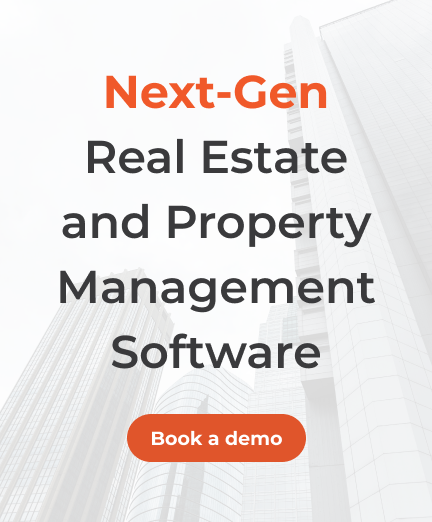Introduction
In the fast-paced world of real estate, efficiency isn’t just a bonus — it’s essential. From tracking rent payments to scheduling maintenance and keeping tenants happy, property management involves countless moving parts. Property management software brings all these tasks under one roof, making your work faster, easier, and more profitable. Whether you manage a single rental or an entire portfolio, this guide will walk you through what it is, how it works, and why it’s becoming a must-have tool for property owners and managers alike.
What is Property Management Software?
Property management software is an all-in-one solution designed to streamline the daily operations of managing real estate assets. Whether for residential apartments, commercial buildings, or mixed-use developments, it enables property managers to handle rent payments, maintenance requests, lease agreements, and tenant screening from a single dashboard. This technology enhances operational efficiency, supports better decision-making through real-time data, and ultimately boosts the property’s value and profitability.
How Does Property Management Work?
The real estate industry is vast, with the global commercial real estate market estimated at approximately 35 trillion U.S. dollars in 2022. The enormity of this industry emphasizes the importance of strategic management tactics. Property management involves careful coordination of various tasks to meet the needs of both property owners and tenants, all aimed at optimizing property performance and ensuring a harmonious living or working environment. The process typically includes:
Property marketing and advertising
Effective property management begins with marketing and advertising. Property managers employ various strategies to attract potential tenants, such as online listings, signage, and advertising in local media.
Tenant screening and leasing
Once inquiries start pouring in, property managers conduct thorough tenant screenings to ensure that they select reliable and financially stable individuals. They are also responsible for drafting and managing leases, outlining the terms and conditions of the rental agreement.
Unit preparation
Before new renters move in, the property manager handles the cleaning and preparation of units, creating a welcoming environment for occupants.
Rent collection and financial management
Property managers handle the collection of rent and other fees. They also maintain accurate financial records, including expenses and income.
Maintenance and repairs
Timely and efficient maintenance is crucial for retaining tenants and preserving the property's value. Property managers coordinate routine maintenance, respond to repair requests, and manage relationships with contractors and service providers.
Property inspections
Regular inspections proactively pinpoint potential concerns before they escalate. Property managers conduct inspections to assess the property's condition, ensuring that it meets safety standards and identifying any necessary repairs or improvements.
Handling late payment and conflict resolution
Effective communication is essential in property management. Managers act as intermediaries between owners and tenants, addressing concerns, resolving conflicts, and maintaining positive relationships.
Benefits of Property Management
Property management offers numerous benefits for property owners, including:
High quality tenants:
Property managers streamline tenant screening, ensuring reliable occupants who pay rent punctually, follow rules, and maintain positive relationships with neighbors. The screening process includes thorough background checks and security deposit procedures.
Improve tenant retention:
Routine maintenance addresses issues before they escalate, contributing to higher tenant satisfaction and retention rates. Well-maintained properties reduce turnover, ensuring consistent income for property owners.
Efficient rent collection:
Property managers enforce rent collection professionally, emphasizing its non-negotiable nature. Their involvement serves as a buffer in managing delinquent tenants and streamlining eviction processes when necessary.
Competitive rental rates:
Staying updated on real estate and rent trends, property managers determine competitive rental rates and recommend adjustments when needed. This expertise ensures property owners maximize profits by charging appropriate rents.
Legal compliance:
Property managers shield owners from legal complications by navigating federal, state, and local laws governing rental properties. Their understanding of landlord-tenant, property, and contract laws prevents issues like unlawful eviction, security deposit disputes, and fair housing discrimination lawsuits.
Lower maintenance costs:
Leveraging established relationships with service providers, property managers secure quality services at lower rates. Their experience allows them to swiftly address maintenance issues, saving property owners time, and money, and ensuring optimal property maintenance.
Increase efficiency and savings:
By streamlining day-to-day operations, property managers enhance efficiency in addressing resident concerns, managing maintenance work orders, and scheduling tenant viewings. This organized approach eventually leads to increased savings.
Types of Property Management
Property management is a diverse field, with various specialized areas, including:
Residential PM: This focuses on managing residential properties such as single-family homes, apartments, and condominiums.
Commercial PM: Dealing with office buildings, retail spaces, and industrial properties, it is tailored to the unique needs of businesses.
Industrial PM: This involves overseeing properties used for manufacturing, distribution, or storage.
Retail PM: Centrally concerned with the management of shopping centers, individual retail stores, and other retail spaces.
HOA Management: Homeowners Association (HOA) management focuses on maintaining common areas and enforcing community rules in residential developments.
Vacation Rental Management: Specialized in managing short-term rentals, ensuring properties are well-maintained and bookings are optimized.
Real Estate Asset Management: A strategic approach to managing an entire real estate portfolio, including acquisition, development, and disposition.
Facilities Management: Broader in scope, facilities management oversees the day-to-day operations of a building or facility, comprising maintenance, security, and more.
Emerging Trends in Property Management
As technology and societal trends evolve, so does the field of property management. Some emerging trends include:
Integration of Technology:
Property managers leverage property management software for streamlined processes, automating rental collection, contract renewals, and maintenance requests, ensuring efficiency, and staying competitive.
Escalation in Property Market Rates:
Stagnant income growth and rising property costs drive individuals towards renting instead of buying, leading to a surge in demand for rental properties.
Growing Demand for Property Management Services:
Increased rental demand elevates the responsibilities of landlords, emphasizing the need for efficient services to stay competitive.
Tenant Preferences for Enhanced Facilities:
The work-from-home trend amplifies the demand for rental properties offering suitable environments, with tenants seeking amenities like washers, dryers, high-speed internet, and soundproof walls.
Emphasis on Effective Marketing Strategies:
Property managers prioritize mobile-friendly websites, social media presence, and positive reviews to attract quality tenants and build strong tenant-owner relationships.
Focus on Energy Efficiency:
In response to eco-friendly demands, landlords invest in energy-efficient features, such as solar heating systems, presenting a unique facet of modern property management trends.
These emerging trends underscore the need for adaptability and innovation, ensuring a strategic response to the evolving demands of the industry in 2024 and beyond.
What Are the Best Ways to Manage a Property Effectively?
It involves:
Establishing open lines of communication with both owners and tenants to address concerns promptly.
Implementing a proactive maintenance strategy to identify and address issues before they become major problems.
Utilizing property management software and technology to streamline processes and improve overall efficiency.
Maintaining transparent financial records to keep owners informed about the financial performance of their properties.
Property Management Software
Property management software plays a pivotal role in streamlining tasks and improving overall efficiency. Its key features include
Lease and Sales Management
Property Management Software offers a seamless solution for property sales and leasing, including moving in/out workflows, document management, and advanced search options.
Community Management
It offers self-sufficient living, seamlessly connecting residents and amenities, and provides security, maintenance, and collaboration features for integrated services.
Visitor and Parking Management
Property management software offers an integrated security solution for various properties, providing access to all security activities for streamlined daily operations.
Inspection Management
It simplifies maintenance activities for property operations, offering easy access to service information providers, and ticketing tools for efficient task assignment and completion.
Facility and Asset Management
It streamlines maintenance activities for property operations, providing accessible information on services and providers, alongside smart tools for ticketing, task assignment, and execution.
Inventory and Procurement Management
Efficiently manage inventory and procurement needs ensuring smooth operations and optimal resource utilization.
Accounting Management
It provides a robust system to handle all financial operations for property management, including receivables, payables, invoice accessibility, and facilitated transactions.
Services Marketplace
Property Management Software provides a comprehensive search and access platform for integrated community services, spanning skilled labor, maintenance, and special needs, ensuring access to a diverse range of marketplace services.
Marketing and Listing
It introduces integrated and updated facilities for property listing, ensuring a user-friendly experience. Its powerful search and listing features connect owners with suitable prospects in the marketplace.
Stay Management
It delivers a personalized solution for short-term stays, providing convenient access via user-friendly apps for check-in, assistance, and facility use, ensuring an effortless experience from arrival to departure.
Operations Management
Operations Management efficiently categorizes staff, allocates maintenance time sheets, and analyzes consumption needs.
Broker Management
Facilitate remote information management, KYC process, contract management, communication, and handle payment transactions.
Property Management Software for Small and Medium Businesses
Gone are the days when property management software was exclusive to large-scale property portfolios. Today, small landlords are increasingly leveraging these innovative tools to streamline their operations and enhance efficiency.
Property Automate’s provides, a leading solution in the market, offers a seamless and efficient experience for small and medium business owners.
With functionalities scaled to fit, including rent collection, expense tracking, and tenant communication, It simplifies day-to-day tasks for property managers. Affordable and customizable, this innovative software empowers small landlords, ensuring competitiveness in the dynamic real estate market.
Conclusion
In today’s competitive real estate market, efficiency and organization are key to long-term success. Property management software like Property Automate equips property managers with the tools they need to stay ahead — from automating routine tasks to customizing workflows for unique business needs. By simplifying operations and improving accuracy, it allows you to focus on what truly matters: delivering exceptional service and growing your portfolio. Take the first step toward smarter property management — book your free demo today and experience how Property Automate can transform your business.
FAQs
1.How can property management software benefit small and medium businesses (SMBs)?
Property management software streamlines operations for SMBs by automating tasks like rent collection, maintenance requests, and tenant communication. It enhances efficiency, reduces manual workloads, ensures compliance, and empowers SMBs to manage properties seamlessly, ultimately improving their overall productivity and profitability in the real estate sector.
2. What features does property management software offer to streamline communication with tenants?
Property management software facilitates efficient tenant communication through features like messaging portals, automated notifications for rent payments and maintenance requests, and centralized communication logs. It ensures quick and transparent interactions, enhancing landlord-tenant relationships and overall satisfaction.
3. Are training and customer support available for SMBs adopting property management software?
Yes, property management software providers typically offer training and customer support for SMBs adopting their platforms. This includes onboarding assistance, tutorials, and responsive customer support channels to ensure a smooth transition and effective utilization of the software's features.
3. Can property management software integrate with accounting software commonly used by SMBs?
Yes, many property management software, including Property Automate, are designed to integrate seamlessly with commonly used accounting software. This integration streamlines financial processes, facilitates accurate record-keeping, and enhances overall efficiency in managing property-related finances.
4. How can SMBs use property management software to handle maintenance requests efficiently?
SMBs can efficiently handle maintenance requests using property management software by providing tenants with a dedicated portal to submit requests. The software streamlines the process by automating work orders, tracking maintenance progress, and ensuring timely resolutions.
5. Can property management software replace a property manager?
While software can automate many tasks, a property manager's expertise in communication, conflict resolution, and strategic decision-making remains invaluable.





